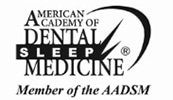

Sleep apnea occurs when the muscles relax during sleep, allowing the soft tissue to collapse and block the airway. As a result, sleep apnea may cause you to stop breathing for a few seconds to more than a minute. Dr. Rita Tempel provides sleep apnea treatment for patients in Gettysburg, PA. She has advanced training in dental sleep medicine as a Diplomate of the American Academy of Dental Sleep Medicine.


What are Common Signs of Sleep Apnea?
Patients with obstructive sleep apnea often experience these symptoms:
- Snoring
- Daytime sleepiness or fatigue
- Gasping for air
- Irritability
- Fragmented sleep
Disruptions in breathing can contribute to heart problems. Episodes of low blood oxygen increase patients’ risk of stroke and heart attack. Patients need their sleep apnea symptoms treated by a professional before their symptoms worsen. Over time, periods of sleep apnea can increase in frequency, making it difficult to get a good night’s sleep.
How to Treat Sleep Apnea in Gettysburg, PA
Traditionally, patients benefit from continuous positive airway pressure (CPAP) machines. These machines deliver a steady stream of air to patients through a nasal mask. However, patients with milder forms of sleep apnea benefit from quieter, much more portable treatments like oral appliances.
Dr. Tempel can create custom oral appliances for patients using her digital scanner. The digital scan ensures the oral appliance precisely fits the upper and lower teeth. She takes this impression to ensure that the oral appliance precisely fits the upper and lower rows of teeth.
Worn during sleep, oral appliances move the lower jaw forward to open up the airway. They also help prevent the tongue from blocking the throat. Patients who wear an oral appliance can experience better sleep and minimize sleep apnea symptoms like snoring and fatigue.
Sleep Apnea Q&A
Do you want to know more about sleep apnea? Read answers to these commonly asked questions about sleep apnea:
What are the risk factors for sleep apnea?
Patients who smoke or drink excessively are more prone to sleep apnea. Smoking and drinking can increase inflammation and fluid in the airway. Patients are more likely to develop sleep apnea as they age, typically once they turn 40 or older. Patients with excess weight or larger necks also have smaller air passageways, contributing to sleep apnea.
Does sleep apnea go away?
Sleep apnea does not go away on its own. To stop its symptoms, patients must treat it and its contributing factors. Losing weight, using a CPAP machine, or wearing an oral appliance can help minimize these symptoms.
Can lifestyle changes help treat sleep apnea?
Lifestyle changes can significantly improve sleep apnea symptoms, especially in mild cases. Maintaining a healthy weight is one of the most effective strategies, as excess fat around the neck can contribute to airway obstruction. Avoiding alcohol and sedatives, quitting smoking, and sleeping on your side instead of your back can also reduce the frequency of apnea episodes. Regular exercise may also improve symptoms by increasing muscle tone and overall health.
What happens if sleep apnea is left untreated?
Untreated sleep apnea can lead to a host of serious health complications, such as high blood pressure, heart disease, stroke, diabetes, and even memory problems. The interrupted sleep caused by sleep apnea leads to chronic fatigue, which can impair daily functioning and increase the risk of accidents. In addition, untreated sleep apnea can contribute to depression and anxiety, further affecting quality of life.
Is sleep apnea common?
Yes, sleep apnea is a relatively common condition. It is estimated that 1 in 4 adults has some form of sleep apnea. However, many people with sleep apnea are undiagnosed, as the condition often goes unnoticed by the person affected but may be evident to a bed partner. Early diagnosis and treatment can help prevent the long-term health consequences of sleep apnea.
Can sleep apnea affect my mental health?
Sleep apnea can significantly affect mental health due to the chronic fatigue and interrupted sleep patterns it causes. The lack of restorative sleep can contribute to mood swings, anxiety, and depression. In addition, the cognitive effects of sleep deprivation can impair memory, concentration, and decision-making, leading to further emotional distress.
Treat Your Snoring
Stop sleep apnea today. Call (717) 853-1552 or request an appointment on our website. Please let Dr. Tempel know if you have specific questions about your symptoms or sleep apnea treatment.
